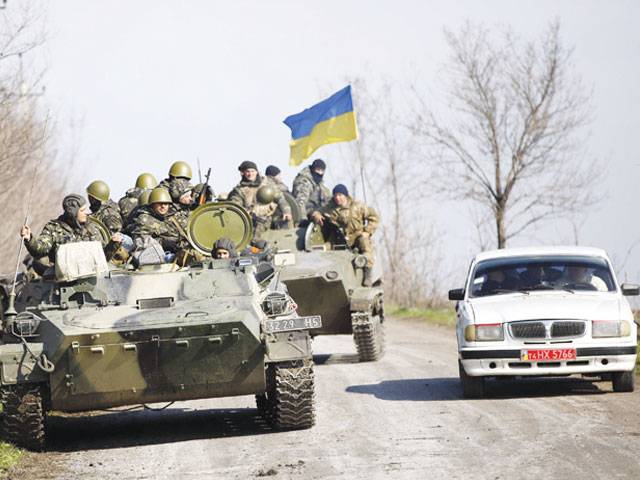KIEV - Ukrainian forces and pro-Russian militias were due Saturday to pull back their troops from a demilitarised zone created under a new peace plan agreed in marathon overnight talks.
A nine-point agreement thrashed out in the early hours of Saturday in the Belarussian capital Minsk also requires the withdrawal of all “mercenaries” from eastern Ukraine and an immediate end to hostilities. But Russia appeared ready to keep up the pressure on its westward-leaning neighbour by sending in a new convoy it claimed was carrying aid for the rebel-held city of Donetsk that Ukraine never approved.
Former Ukrainian president Leonid Kuchma - representing Kiev throughout stuttering efforts to resolve the five-month conflict - said the agreement rested on the creation of a 30-kilometre (20-mile) buffer zone.
Forces from both sides are required to retreat 15 kilometres from current frontlines within 24 hours of the signing of the accord and allow monitors from the OSCE pan-European security organisation into the area to make sure the truce holds.
Territory under rebel control would be left open to their administration under a temporary self-rule plan adopted by lawmakers in Kiev on Tuesday.
The Minsk pact - also signed by Moscow’s ambassador to Kiev and the self-proclaimed “prime ministers” of the rebel-run regions of Donetsk and Lugansk - aims to shore up a ceasefire deal agreed two weeks ago. The latest agreement crucially requires both sides to immediately withdraw “foreign mercenaries” from the conflict zone in industrial eastern Ukraine.
Kiev and Western allies accuse Russia of clandestinely slipping at least 1,000 paratroopers into east Ukraine to help the guerrillas mount a surprise counter-offensive late last month.
The Kremlin denies ordering soldiers into Ukraine. But Moscow’s Kiev envoy Mikhail Zurabov told Russian media after the Minsk signing ceremony that both sides appeared to have hired foreign mercenaries.
Both sides agreed to leave the most divisive political issues concerning the rebel-held area’s status for future negotiation in order to get the terms of the truce worked out first.
The elusive ultimate goal is to find a lasting solution to a conflict that has claimed nearly 3,000 lives and stoked Western alarm about Russia’s territorial ambitions.
The talks came in the wake of a peace overture by Ukrainian President Petro Poroshenko that included a limited self-rule offer for separatist-controlled areas in the east and an amnesty for all fighters.
The offer was welcomed in Moscow but treated with caution by rebel commanders who had been seizing back large swathes of territory from Ukrainian forces in the days preceding the September 5 truce.
The ceasefire has helped calm the worst fighting but continues to be regularly broken around Donetsk - the scene of almost daily shelling on the city’s outskirts - and other disputed parts of the Russian-speaking industrial heartland.
The Ukrainian said Saturday one soldier had died in the latest day of fighting. Thirty-five government troops and civilians have been reported killed by state and local authorities since the truce.
AFP reporters in Donetsk also saw three massive explosions, followed by small mushroom clouds, go off in the dawn hours Saturday at a rebel-held building that once housed a Soviet-era munitions factory.
“When the first two explosions went off I woke up,” said a 15-year-old schoolboy named Bogdan. “I could feel the wave of the impact, the vibrations in my body.”
Local officials reported no casualties but could not immediately explain what set off the blasts.
Rebel representatives in the city of nearly one million said they had also received a huge Russian humanitarian convoy overnight - a type of shipment Kiev believes Moscow may be using to secretly supply the rebels with arms.
Ukraine’s national security and defence council spokesman Volodymyr Polyovy said Russia had “violated international law and our sovereignty” because it never gave Ukrainian customs officials a chance to inspect the cargo.
The Minsk meeting came at the end of a dizzying week for Poroshenko that included Ukraine’s ratification of a landmark EU association agreement for which he personally lobbied and a visit to Washington for talks with US President Barack Obama.
But the 48-year-old chocolate baron failed to convince Obama to become more directly involved in resisting Russia’s “aggression” by providing Kiev with offensive arms.
The United States instead approved an additional $46-million non-lethal aid shipment that will provide Ukraine with equipment such as night vision goggles and bullet-proof vests.
Ukraine was still set to receive an important boost from the 28-member NATO military alliance when its defence chiefs gather Saturday in the Lithuanian capital Vilnius for a three-day meeting focused on ways to counter Kremlin’s expansionist threat.
The Western military alliance - of which Ukraine is not a member - is due to set up regional command centres in eastern Europe that would help coordinate the actions of a rapid-response “spearhead” force approved by NATO earlier this mont.
Friday, April 19, 2024
Rival Ukraine forces ready pullback under new peace plan

8:27 AM | April 19, 2024
8:09 AM | April 19, 2024
No damage to Iranian nuclear sites after Israeli airstrikes, says UN nuclear watchdog
12:50 PM | April 19, 2024
Ch Shafay visits Directorate of Consumer Protection Council
April 19, 2024
ECP reviews arrangements for by-elections in Punjab
April 19, 2024
Punjab’s price control initiative: A welcome step
12:33 PM | April 19, 2024
A Tense Neighbourhood
April 19, 2024
Dubai Underwater
April 19, 2024
X Debate Continues
April 19, 2024
Hepatitis Challenge
April 18, 2024
IMF Predictions
April 18, 2024
Kite tragedy
April 19, 2024
Discipline dilemma
April 19, 2024
Urgent plea
April 19, 2024
Justice denied
April 18, 2024
AI dilemmas unveiled
April 18, 2024
ePaper - Nawaiwaqt
Advertisement
Nawaiwaqt Group | Copyright © 2024





